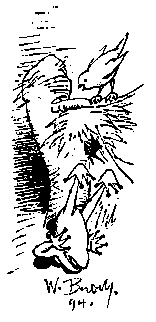Doesn’t every German speak English?

Translations from German into English are often underestimated and consequently entrusted to amateurs – after all, most Germans enjoyed a few years of English instruction in school. Unfortunately, this fact leads many to believe that they can do a simple translation on their own. But as German cartoonist Wilhelm Busch so concisely (and humorously) showed us: flailing your arms alone does not make you a bird.
(Busch’s poem was beautifully rendered in English by my colleague D. Fogg – I would not be able to improve on his translation, which can be found here.)
The countless examples of flawed or erroneous translations that pop up in all our media on a daily basis are proof that – even with seemingly simple and straightforward texts – high-school English does not provide a sufficient foundation for a correct, well-phrased, and euphonious translation. A good translation requires years of experience as well as a profound knowledge of the cultures in which the two languages are rooted.
“Translation is not a matter of words only: it is a matter of making intelligible a whole culture.” (Anthony Burgess)
Classic examples like „Fußballventilatoren“ (for soccer fans) on the welcome sign of an English hotel may be shrugged off with a smile – somebody must have confused the two meanings of fan when looking up the translation in a dictionary. But how would you explain the ludicrous translation “mishaps” you often find in literature and the media, from turtleneck being translated literally as “the neck of a turtle” to penny roll as “a roll of pennies”?
Amazingly, many such “accidents” remain undiscovered, because those who speak English would read or watch the original, while those who are not proficient enough in English might wonder about the strange word without being able to “decode” its meaning through reverse translation. Even professional readers and editors usually do not read both versions side by side, and in the daily rush of the electronic media, there is often no time at all for proofreading.























































